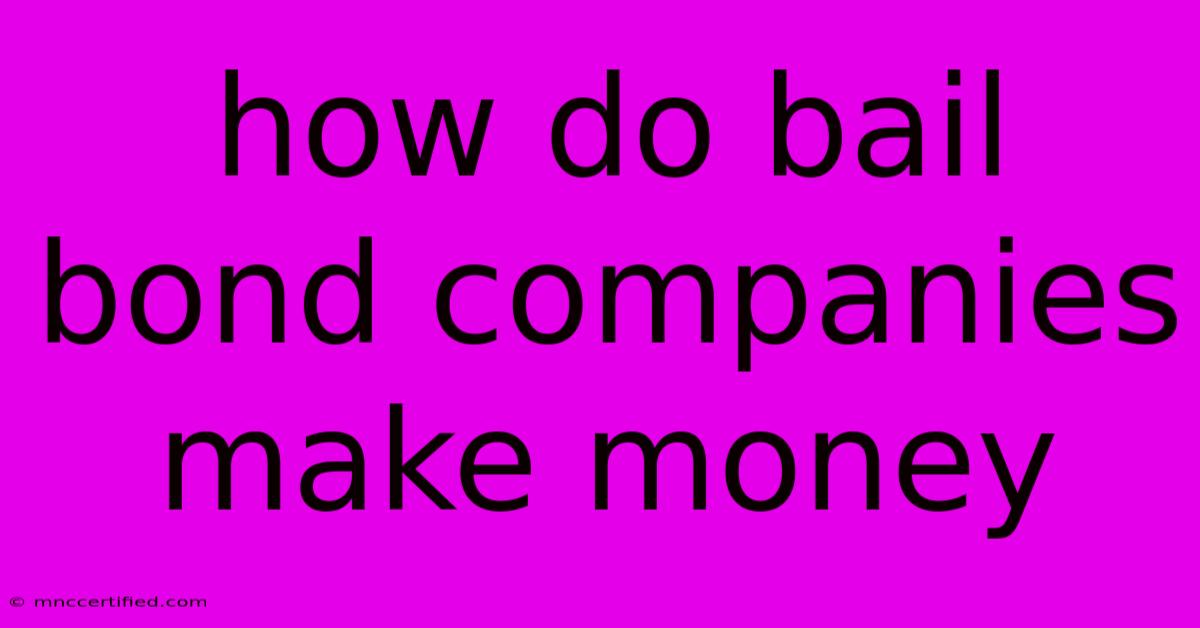How Do Bail Bond Companies Make Money

Table of Contents
How Do Bail Bond Companies Make Money? Unraveling the Bail Bond Industry
The bail bond industry, often shrouded in mystery, plays a crucial role in the criminal justice system. But how exactly do these companies make a profit? Understanding the inner workings of the bail bond business can shed light on this complex and sometimes controversial sector.
The Basics of Bail Bonds
Before diving into the revenue streams, let's define the basics. A bail bond is a financial agreement between a bail bond company and a defendant, guaranteeing their appearance in court. In essence, the company posts a sum of money (the bail) to the court, allowing the defendant to be released from jail while awaiting trial. The defendant, in return, pays a non-refundable fee to the bail bond company, typically a percentage of the total bail amount.
Key Revenue Sources
1. Non-Refundable Fees: This is the primary source of income for bail bond companies. These fees, usually between 10% and 15% of the bail amount, are paid upfront by the defendant. It's a non-refundable fee, meaning even if the defendant appears in court as scheduled, the company keeps the fee.
2. Collateral: Bail bond companies often require collateral from defendants to secure the bail bond. This collateral can be anything of value, like real estate, vehicles, or even valuable personal items. If the defendant fails to appear in court, the company can seize this collateral to recoup its losses.
3. Bounty Hunting: In certain cases, bail bond companies may employ bounty hunters to locate and apprehend defendants who have skipped bail. These bounty hunters are licensed professionals who are paid a fee for successfully returning the defendant to custody.
4. Interest on Collateral: Some bail bond companies might charge interest on collateral, adding an extra revenue stream.
5. Additional Fees: Companies might also charge additional fees for services like:
- Surrender Fees: Charged when the defendant surrenders themselves to the court.
- Re-Bonding Fees: Charged when the defendant's bail is increased or changed.
- Travel Expenses: Charged for costs incurred when transporting a defendant to court.
Understanding the Risks
While bail bond companies have multiple revenue streams, it's crucial to understand the inherent risks associated with their business:
- Non-Appearance Risk: The most significant risk is that the defendant will fail to appear in court, leading to the bail bond company losing the entire posted bail amount.
- Collateral Recovery Challenges: Recovering collateral from a defendant who skips bail can be difficult and time-consuming.
- Legal Costs: There are legal costs associated with pursuing a defendant who fails to appear, including legal fees and court costs.
Ethical Considerations
The bail bond industry is not without its critics. Some argue that the high non-refundable fees unfairly burden low-income individuals, while others express concerns about the potential for abuse and exploitation by certain companies. Transparency and ethical practices are essential to ensure a fair and just system.
Conclusion
The bail bond industry operates on a complex system of fees, collateral, and potential risks. Understanding these nuances is vital for individuals seeking bail and for those wanting to navigate this specific legal domain.

Thank you for visiting our website wich cover about How Do Bail Bond Companies Make Money. We hope the information provided has been useful to you. Feel free to contact us if you have any questions or need further assistance. See you next time and dont miss to bookmark.
Featured Posts
-
Tax Benefits Of Oil And Gas Investing
Nov 10, 2024
-
Coco Gauff Wins Wta Finals Sets Prize Money Record
Nov 10, 2024
-
Are Nutritionist Covered By Insurance
Nov 10, 2024
-
Remembrance Sunday Events In Surrey 2024
Nov 10, 2024
-
Good For 5 Cents In Trade Token Value
Nov 10, 2024